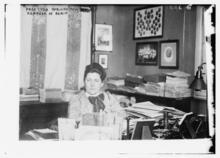Elsa Neumann
Elsa Neumann was the first woman to receive a doctoral degree from the University of Berlin. In 1899, nine years before women were officially allowed to study at the University, she received her doctoral degree in physics. She became an independent scientist working in a private chemical laboratory in Germany and also carried out research for the newly established airship industry. In 1902 she was a crew member on the flight of a Zeppelin airship in 1902. In 1900 she used her prominence in Berlin society to establish a highly successful association that gave grants to female students. Neumann died in 1902 as a result of an accident during an experiment in the chemical laboratory at which she worked.
A pioneer among women scientists in Germany, Elsa Neumann was the first woman to receive a doctoral degree at the University of Berlin (in 1899), nine years before women were officially allowed to study. She became a scholar and a pioneer in aviation research, participating in a flight in a Zeppelin airship in 1902.
Early Life & Education
Elsa Neumann was born in Berlin on August 23, 1872 to a relatively wealthy family. Her father, a banker and later a man of independent means, was interested in zoology and biology. Of the family’s three daughters and four sons, Elsa was the only one to receive higher education. When she decided to study science, she needed enormous energy and support since at that time neither girls’ higher education nor women’s colleges existed in Germany. After private tutoring at home, she became a guest student of mathematics, physics, and chemistry at universities in Goettingen and Berlin, requiring official permission from every one of the professors whose lecture she wished to attend. On February 18, 1899, she received her doctoral degree in physics at the University of Berlin under Emil Warburg (1846–1931) and Max Planck (1858–1947). She was the first woman graduate and the first woman physicist.
Career & Support of Women in Education
Fully aware that there were no employment opportunities for women scientists in Germany, Elsa Neumann sought a position in Great Britain. From 1899 until 1900 she was a visiting scholar at the Cavendish Laboratory in Cambridge. Back in Berlin, she managed to become an independent scientist working in the private chemical laboratory of Arthur Rosenheim (1865–1942) and Richard Joseph Meyer (1865–1939), changing her scientific interests to work on chemistry instead of physics. She also carried out research for the new established airship industry in Germany. In June 1902 she was a member of the crew of a Zeppelin airship, together with Ferdinand Zeppelin (1838–1917) and a few other (male only) scientists.
From 1899, Elsa Neumann was a prominent figure in Berlin society. All Berlin newspapers reported her degree and welcomed the city’s first woman scientist. She became a star in the print media, using her popularity to found an association for making grants to women students. The association, which was established in April 1900, had both women and men members, including Berlin professors such as Max Planck, Walther Nernst (1864–1941), and Arthur Koenig (1856–1901) and most of the first generation of women scientists in the city. Elsa Neumann was the first president, followed in 1902 by the bacteriologist Lydia Rabinowitsch-Kempner. The association was highly successful, supporting a number of women students.
Neumann’s Death & Legacy
Elsa Neumann died on July 23, 1902 as a result of an accident during an experiment in the chemical laboratory at which she worked. During her studies in Goettingen she had saved the life of (later) Nobel-prize-winner Otto Wallach (1847–1931), after an accident in his laboratory. Her tragic death was reported in all Berlin newspapers, which also wrote about her life, her fate, and her funeral.
In 1904, Elsa Neumann’s mother established the Elsa Neumann Prize at the Faculty of Philosophy of the University of Berlin in memory of the first woman scientist, to be awarded for the best thesis in mathematics or physics of the year. The rules stipulated that the prize be given to the best candidate, irrespective of sex, and no woman student received the prize between 1906 and 1918. After 1918 the prize capital disappeared due to the war and the currency inflation of 1923. During the Nazi period, Elsa’s beloved sister Alice committed suicide because of the persecution, while her brothers were murdered in death camps.
Only in 1999 did the University of Berlin remember its first woman graduate. The physicists of the Humboldt University organized a special colloquium to honor Elsa Neumann and in 2002 celebrated the second Elsa Neumann Colloquium.
Kohut, Adolph. Berühmte israelitische Männer und Frauen in der Kulturgeschichte der Menschheit. Lebens- und Charakterbilder aus Vergangenheit und Gegenwart. Ein Handbuch für Haus und Familie. Leipzig-Reudnitz: A. H. Payne, 1900/1901; Vol. 2, 423.
Vogt, Annette. “Elsa Neumann—erste Promovendin an der Berliner Universität.” In Berlinische Monatsschrift 6 (1997) 8: 27–32.
Fiedler, Annett. Die Physikalische Gesellschaft zu Berlin. Aachen: Shaker, 1998. 199–202.
Vogt, Annette. Elsa Neumann—Berlins erstes Fräulein Doktor. Hrsg. der Dokumente und Essay. Berlin: Verlag für Wissenschaftliche- und Regionalgeschichte Dr. Michael Engel, 1999.





